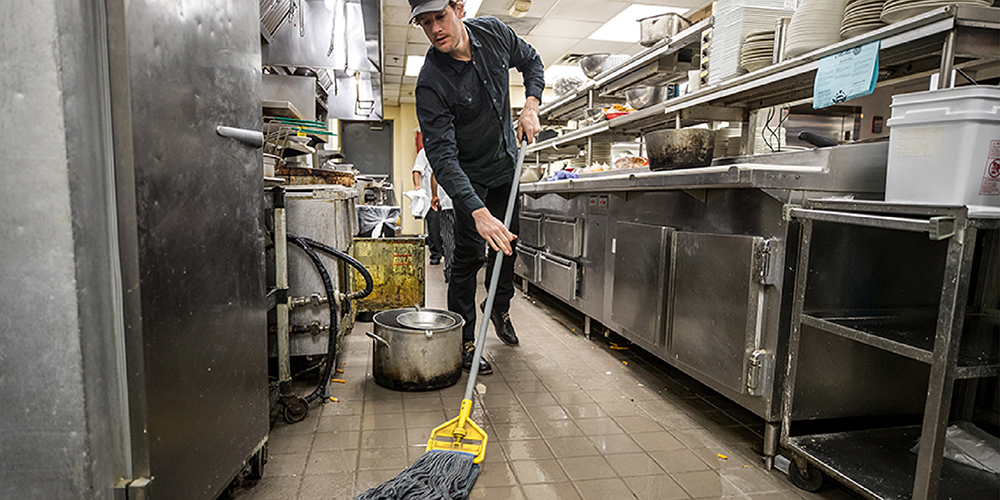Updated 04/08/2024
We know that job interviews can be daunting. Sitting down with a hiring manager or a recruiter you’ve only met on LinkedIn and convincing them to choose you over a long list of candidates for a role can induce anxiety even in the best of us. With tough competition, how do you win over a total stranger so they’ll know that YOU are their best bet? Here are eight simple steps you can take to sell yourself during the interview process.
Interview Preparation
If you want to know how to sell yourself in an interview, the first step is careful preparation. Learning as much as possible about the company, the position, and your interviewer will demonstrate your interest in the role and give you plenty of talking points.
Do Your Homework
The first step you should take before speaking with a hiring manager at the company is to do some research on whoever your potential employer may be. What’s the company’s mission? Do you know anything about the industry they are in? Can you imagine what their possible pain points are?
Throw in some questions/comments related to company goals or specific products. This not only shows your interest in the company and its mission; it also shows that you are selective about where you want to work. Knowing about the company and its background is impressive to interviewers and can give you a leg up on the competition.
Perfect Your Pitch
Interviews always start with a question about your experience or career story and why you are interested in the position or working with the prospective employer. Count on this kind of question as your first opportunity to make a great impression and to sell yourself. Your response should be a summary of your experience, including phrases or examples that relate to the role you are applying for, and an explanation of how this experience makes you a good fit for the role.
One of the best interview tips is that you don’t have to oversell yourself; be honest and natural in your response. Confidence is good, but avoid coming off as cocky or over-confident, and do not speak for too long. Remember: they have other questions. A TV commercial is 30 seconds because it’s the optimum time to hold attention. Use the same time to sell yourself. Let them know why your experience will benefit the company when they hire you for this role.
Excelling During the Interview
Learning how to sell yourself in a job interview isn’t easy, especially if you want to excel and leave a lasting impression on organizations. It takes practice speaking, thinking critically, and asking the right questions to show you’re the right person for the job rather than simply telling them.
Practice Meaningful Stories
Interviewers will often ask candidates to tell a story about a time you did something at work under certain circumstances and how it went. These are behavioral interview questions, and the point is to understand how you conduct yourself in the workplace, especially in adverse situations.
Read up on the most commonly asked behavioral interview questions and prepare some answers in advance. Don’t make things up. Use real-life examples that showcase your strengths. How you answer these questions can be the determining factor on a job offer, so telling a brief, relevant, and engaging story can be a huge selling point for yourself during the interview.
Turn Your Weakness into a Strength
Throughout your job search, you may notice that hiring managers want to know what areas or skills you need to improve on, what your biggest risks are in certain circumstances, or about a time when you utterly failed at some task and how you managed to come through. Beware of the two most common interview mistakes: answering the “weakness” question in a negative light, or pretending that you are that perfect employee, totally flawless. Everyone has things to work on. Knowing and admitting your flaws during an interview is good, as long as you use the right words and always, always, always pair the weakness with a strength or solution in your answer.
If you tend to be disorganized, say something like, “I’ve always been more of a creative person rather than systematic. With that, I can be a bit disorganized sometimes, but I have my own brand of organization and that actually helps me achieve goals and finish projects on time and well. I recently started creating checklists and adding reminders to my calendar, which has helped significantly.” Turn the weakness into a strength. This shows the interviewer that you actively seek out strategies to improve and grow.
Nothing Negative about Previous Employers
Just before you answer any question about previous employers, take a split second to smile to yourself, and think a positive thought. Even if you truly feel that they were terrible, the circumstances likely taught you a lot.
You never want to lie during an interview, but if you start speaking negatively about previous workplaces, that chip on your shoulder will speak louder than anything else you say in the interview.
Disgruntled isn’t a good look when trying to sell yourself. Instead, focus on the positives, such as personal advancement/growth. Maybe your reason for leaving is a bad boss, but perhaps this position also allows you to cut down a long commute, or provides certain benefits or a workplace culture your previous employer didn’t provide. When in doubt, circle back to all the things that drew you to this new company and opportunity.
Maintaining a Positive Tone When Discussing Past Experiences
When discussing past experiences that were less than a good fit, focus on what you learned or how you improved your skills in the position. Speak to how a past role challenged you, but do not frame those challenges as annoying or frustrating. Give the impression that you can overcome challenges gracefully with a positive mindset rather than being resentful.
Ask Relevant Questions
Asking a great question about the position, the company, or even about the interviewer are a hiring manager’s favorite. Questioning shows genuine interest. If you tend to blank when put on the spot, write down your questions before the interview and bring a notebook and a pen. Taking notes shows that you are interested and prepared – an extra selling bonus!
Easy questions you can ask are: How would you describe the company culture? How does the company keep employees engaged? Recall interesting things that your interviewer mentioned. For example, “The ABC project you mentioned sounds so interesting. Can you please tell me more about that?” Asking questions demonstrates that you’re paying attention.
Speak Your Why
A manager’s worst hiring nightmare might be the candidate who accepts a position, goes through the onboarding and training process, and then realizes the job or company isn’t the best fit for them and quits. The company loses money and time, is still down a team member, and now has to start the hiring process over.
Letting the interviewer know just how excited you are can make them feel more comfortable about offering you the role.
If two candidates have the same qualifications and interview equally well, do you think the employer is more likely to offer the role to the candidate who seemed really eager and excited about the company, or the candidate who didn’t show as much interest or was harder to read? Part of selling yourself during the interview is showing off your enthusiasm for the company and role you are interviewing for.
Practice Makes Perfect
Practice interviewing with a friend, look up common questions and practice answering them by yourself, or record yourself answering questions to see how you sound and look. This will give you a good view of what the interviewer sees during an interview.
You know your strengths better than anyone, so be sure to showcase them as much as possible throughout the process. Every story, every example, every question can showcase your talents and your value to the company. Get comfortable promoting yourself through practice, so you can really sell when the right opportunity comes along!
Want to see open positions at Restaurant Technologies? Search our available jobs here.
Mastering the Art of Self-Presentation
It might not seem like the most essential interview tactic, but you should take advantage of every opportunity to sell yourself when auditioning for new roles. Self-presentation doesn’t simply amount to how you dress and look; you’ll also want to improve your body language and storytelling technique.
Dressing for Success
Today, when virtual interviews are just as common as in-person interviews, dressing up for your meeting may seem silly. However, when it comes to making a favorable impression, it’s better to be over-dressed rather than under-dressed, especially if it’s a client-facing role like many in the restaurant industry. As part of your ensemble, if you’re interviewing in person, include a nice bag or padfolio with extra copies of your resume inside along with a notebook and pen.1
Positive Body Language
Your non-verbal body language fills the gaps in verbal conversation, conveying your interest, enthusiasm, and engagement to your interviewer. Practice good eye contact, affirmatively nodding or smiling, and a firm handshake to stand out as a capable communicator and asset to the team.2
Crafting Your Personal Story
The one interview question you can rely on getting nearly every time is “Tell me about yourself.” Because you can easily predict this question, your answer should be as fine-tuned as possible. Try to tell the story of your background and experience in an engaging and relatable way.
The primary goal should be to give a brief, comprehensive summary of yourself so your interviewer can understand where you’re coming from; your secondary goal should be to show them how your background perfectly aligns you with the opportunity you’re interviewing for.
Following Up Effectively Post-Interview
The art of the post-interview follow-up achieves two things for you. First, it reconfirms your interest and investment in the position. Second, it’s an additional chance to make a favorable impression on the organization. Here’s how to properly follow up post-interview.
Writing a Memorable Thank-You Note
A well-written, meaningful thank-you note is the key to standing out in the interview process. In the note, reference a particularly interesting piece of the conversation to refresh the interviewer’s memory and cement you as the top candidate in their mind.
Timing Your Follow-Up
Roughly 24 hours after your interview, send your thank-you note to reaffirm your interest in the opportunity. Your next chance to follow up is approximately a week after your initial interview.3 Remember that the business may be interviewing multiple candidates, and you want to refrain from appearing pushy or desperate.
A short, positive follow-up is more than sufficient at this stage in the post-interview process.
Continuing the Dialogue
At this point, you may encounter two scenarios requiring further dialogue with the interviewer or interview scheduler: an offer from another company or the unfortunate news that you weren’t chosen for the opportunity.
In either of these scenarios, keep your communication polite, appreciative, and short to increase the chance of a timely response and to keep their impression of you as favorable as possible.
Once you nail the interview, it’s time to consider the top skills to work in a restaurant.
Sources:
- Indeed. How To Dress for a Job Interview (And What Not To Wear). https://www.indeed.com/career-advice/interviewing/how-to-dress-for-a-job-interview
- Udemy. 10 Positive Body Language Techniques to Help you Succeed. https://blog.udemy.com/positive-body-language/
- Harvard Business Review. 4 Ways to Follow Up After a Job Interview. https://hbr.org/2020/11/4-ways-to-follow-up-after-a-job-interview





